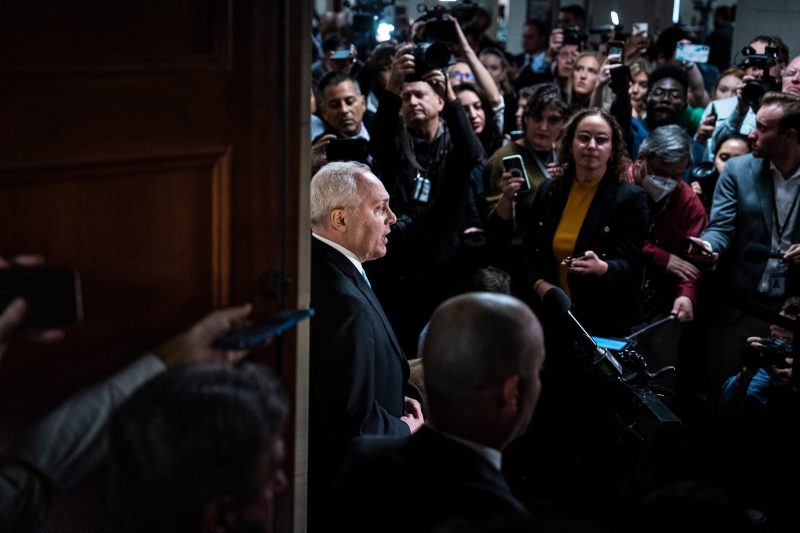House Republicans were on the verge of open revolt Wednesday after the ideologically fractious conference failed to coalesce around a speaker nominee, leaving the chamber rudderless and leaderless for an eighth day.
The inability of House Republicans to agree on who will lead them has left the chamber in an effective standstill since Rep. Kevin McCarthy (R-Calif.) was ousted as speaker, unable to consider any legislation to aid Israel in its war against Hamas or pass any appropriation bills to avoid a potential government shutdown in mid-November. Neither issue produced enough urgency for Republicans to quickly elect a speaker as many had hoped, again highlighting the conference’s deep divisions.
Majority Leader Steve Scalise (La.) was nominated for speaker by a majority of Republicans during a closed, secret-ballot conference meeting early Wednesday. But a significant number of Republicans from across the ideological spectrum said they planned to protest his official election on the House floor. Rep. Jim Jordan (Ohio), Scalise’s challenger, initially refused to say he would back Scalise on the House floor. A spokesperson for the Judiciary chairman later clarified Jordan would back Scalise and offered to give a nominating speech on his behalf.
But in a conference where emotions are raw, divisions are deep and grudges are held after the McCarthy ouster, the slight was another example of the discord that has complicated House Republicans’ ability to elect a new speaker.
“Anyone who thought that the same problems that caused the chaos last week would magically disappear today now know how wrong they were,” Rep. Kelly Armstrong (R-N.D.) said.
With a narrow majority, Republicans can only lose four members to allow anything to pass through their ranks. Democrats have no plans to help elect either Republican candidate as speaker and instead will vote for Minority Leader Hakeem Jeffries (N.Y.) as they did during the 15 rounds of balloting it took for McCarthy to win the gavel this year.
The stalemate led Speaker Pro Tempore Patrick T. McHenry (R-N.C.) to recess the House to avoid the embarrassment of a failed speaker vote. Republicans stood by, wandering around the Capitol, waiting to see if they would meet behind closed doors. Word spread early Wednesday evening that there would be no immediate conference meeting, and eventually the House adjourned, as no clear path emerged for how to elect a speaker.
At least a dozen Republicans have refused to back Scalise for speaker. Their reasons include what they say is the lack of a plan to fund the government, no plan to change how Washington works, anger that McCarthy lost the job, and opposition to giving the next person in line a promotion. Some lawmakers also were angry at Scalise’s effort to block a proposed conference rule change that would have kept House Republicans voting behind closed doors until a speaker nominee earned 217 votes. A vote on the proposed rule change failed in Wednesday’s meeting, and Scalise was able to grab the nomination with a simple majority.
“The House GOP Conference is broken. So we oust Kevin McCarthy and all other leaders are rewarded with promotions? How does that make sense or change anything? We need to chart a different path forward,” Rep. Lloyd Smucker (R-Pa.) said on X, formerly known as Twitter. Smucker said he would vote for Jordan on the floor.
The battle for speaker has become a pivotal moment for House Republicans as they look to settle scores related to divisions that have plagued the conference for years. A handful of McCarthy allies were ready to vote for him on the House floor Wednesday — even though McCarthy has publicly and privately told his colleagues not to nominate him for the role — instead of Scalise because of a years-long feud between both leaders.
“I just choose not to participate in what I consider to be an injustice,” said Rep. Carlos A. Gimenez (R-Fla.), who has pledged to vote for McCarthy when the election comes to the House floor.
Another group of conservatives, many of whom supported Jordan during the closed meeting, remained undecided about whether to back Scalise or continued to say they would back neither candidate if nominated. Scalise narrowly topped Jordan in a conference-wide vote, winning the majority 113-99, with nearly a dozen voting present or for someone else — a significant number since Scalise can only lose four votes on the House floor.
Many members of the House Freedom Caucus, an ideological faction Jordan founded in response to Scalise’s leadership of the Republican Study Committee years ago, have continually expressed worry that Scalise as speaker would just be an extension of McCarthy’s leadership, given that both have served in GOP leadership for about a decade.
“We have to quit having this place run the way it was run,” said House Freedom Caucus Chair Scott Perry (R-Pa.), who has not committed to supporting Scalise.
Multiple Republican lawmakers said it was a monumental mistake for Scalise to block a measure that would have united the Republican conference behind a speaker nominee behind closed doors.
Nearly 100 members backed a rule change that would require the speaker to find 217 Republican votes before they adjourned from their closed, no-phones-allowed conference meeting. Scalise and his allies worked on tabling the motion because they knew he would win the nomination with a simple majority, and made a bet that it would be easier to coalesce around him on the House floor with the public pressure of the cameras rather than if the vote were closed. They were able to successfully table the proposed change.
Rep. Chip Roy (R-Tex.) said he was a “hard no” on Scalise because the vote to elect a speaker was “rushed” to the floor, saying Scalise made a huge “mistake.”
Several McCarthy allies left the closed meeting looking serious and angry, with many refusing to talk with reporters. A handful had been discussing nominating McCarthy on the floor, but when Scalise won the nomination in conference, it solidified the decision for a certain bloc to do so.
For some members, the decision to stick with Jordan was based on various plans to ensure the government is funded by Nov. 17, when a short-term funding extension expires. Multiple lawmakers who attended candidate forums this past week said Jordan proposed putting forward a stopgap spending bill, known as a continuing resolution, that funds the government at current levels for six months.
But many hard-right members are vehemently against any short-term spending bill because it would rely on Democratic support to pass — a reason McCarthy was ousted. But they are also supportive of a mechanism that would be triggered if the government is funded at current levels through the beginning of the year. A six-month CR would trigger an automatic 1 percent cut in government spending in April if Congress is unable to pass its funding bills.
Rep. Thomas Massie (R-Ky.), who proposed the 1 percent cut that became law during the debt ceiling debate earlier this year, met with Scalise after the closed meeting and said on X that he “let Scalise know in person that he doesn’t have my vote on the floor, because he has not articulated a viable plan for avoiding an omnibus.”
“It’s really, really hard for this Republican House to govern. We have incredibly tight margins and, frankly, some members who have a hard time getting to yes on almost anything on almost every week,” Rep. Dusty Johnson (R-S.D.) said. “I’m a pragmatist. I just understand that I never get everything I want in any negotiation. There are a lot of people around here who don’t understand that, and it makes it hard to govern.”
Asked whether this standstill complicates House Republicans’ ability to retain the majority in next year’s elections, Johnson skirted the question saying, “it would be easier with bigger margins and, frankly, I think would be easier in a political environment where people understood that governing requires some give and take.”
Compounding the challenges for both Scalise and Jordan are their pasts.
Rep. Nancy Mace (R-S.C.), who voted in support of ousting McCarthy last week, said she could not vote for Scalise because she learned Tuesday evening that he spoke at a white supremacist rally while serving as a state representative in Louisiana.
While a Scalise adviser confirmed he spoke at an event founded by former Ku Klux Klan leader David Duke in 2002, he denied knowing that the event was affiliated with racists and neo-Nazis. “Given what’s happening in Israel right now, I just cannot support someone who’s associated with anything that is divisive, whether it’s race or religion. I’m just a hard pass on that,” she said.
Many other moderate Republicans have expressed similar concerns over Scalise’s past, but they have not done the same with Jordan, who has been accused of ignoring a sexual abuse allegation that Ohio State wrestlers made against a doctor while Jordan coached there.
Paul Kane, Theodoric Meyer and Mariana Alfaro contributed to this report.
Rep. Lloyd Smucker’s state was misidentified in an earlier version of this report. Smucker represents Pennsylvania in Congress, not Texas. This version has been corrected.





























